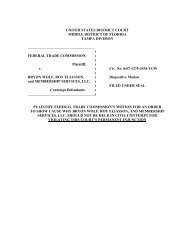Gasoline Price Changes - Federal Trade Commission
Gasoline Price Changes - Federal Trade Commission
Gasoline Price Changes - Federal Trade Commission
Create successful ePaper yourself
Turn your PDF publications into a flip-book with our unique Google optimized e-Paper software.
THE DYNAMIC OF SUPPLY, DEMAND, AND COMPETITION<br />
production disrupted, consumers quickly depleted gasoline supplies, especially when gasoline<br />
demand surged, as people in the greater Detroit area drove greater distances to fill up their<br />
vehicles. Anticipating difficulties in finding environmentally compliant substitute gasoline for<br />
the Detroit area, like those experienced in June 2000, Governor Granholm sought the EPA’s<br />
approval to waive the environmental specifications for gasoline used in southeast Michigan the<br />
day after the blackout. 16<br />
The August 2003 depletion of gasoline supply and surge in gasoline demand in the<br />
greater Detroit area still had an impact on price, although prices did not rise as much as if the<br />
waiver not gone into effect. One week prior to the blackout, the average price for a gallon of<br />
gasoline in the greater Detroit area was $1.59. Ten days after the outage, gasoline prices in the<br />
greater Detroit area had increased to an average of $1.77, and just before Labor Day, weekend<br />
prices peaked at nearly $1.88 per gallon. As refineries came back on line and production started<br />
to regain normal levels, gasoline prices began to fall. 17<br />
2. In the Northeast, a major shift in the type of environmentally<br />
mandated fuel occurred without significantly increased gasoline<br />
prices or price variability.<br />
One type of environmentally safer gasoline used in many parts of the U.S. is reformulated<br />
gasoline (RFG). RFG requires the addition of an oxygenate to the fuel. The two oxygenates<br />
used in the U.S. are ethanol and methyl tertiary butyl ether (MTBE). MTBE has been the<br />
primary oxygenate used in RFG in many areas of the country, including the Northeast. The use<br />
of MTBE has raised concerns about groundwater contamination and other environmental issues,<br />
however, and various governmental entities have banned, or considered banning, MTBE.<br />
Beginning on January 1, 2004, New York and Connecticut prohibited the use of MTBE<br />
as an oxygenate. This decision meant that not only would gasoline distributors use ethanol to<br />
replace MTBE, but it also required a different blendstock (referred to as “reformulated<br />
blendstock for oxygenate blending” (RBOB) 18 ) in which to mix the ethanol. New York and<br />
Connecticut distributors needed RBOB from refineries, but could not rely on nearby refineries to<br />
meet the new demand for RBOB. The Northeast lacks refinery capacity sufficient to meet<br />
gasoline demand; gasoline distributors rely on imported refined gasoline to meet consumer<br />
demand. Refineries on the Gulf Coast send gasoline via pipelines, and Europe and South<br />
America also send refined petroleum products to New York and Connecticut.<br />
Whether refineries in Europe and South America would make the investments necessary<br />
to produce RBOB in quantities sufficient to meet the new demand in New York and Connecticut<br />
was unclear; 19 producing low-vapor-pressure RBOB is a more costly and difficult process than<br />
producing RFG with MTBE. 20 In late 2003, anticipating the MTBE ban in New York and<br />
Connecticut, a number of petroleum traders and the Energy Information Administration (EIA)<br />
predicted that the Northeast could expect gasoline price volatility and price spikes in the spring<br />
of 2004, when refiners would first have to supply RBOB for blending with ethanol. 21<br />
Nonetheless, by March 2004, a number of European refineries were making RBOB, 22 and by<br />
CHAPTER 4: THE REGIONAL LEVEL 75
















